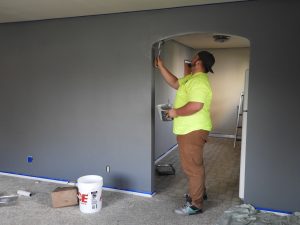Georgia’s Right to Repair Statute
 So, you hired a contractor to do work on your home. The next thing you know, the vendors haven’t shown up on time, the project is late, and the contractor is demanding more money. What do you do?
So, you hired a contractor to do work on your home. The next thing you know, the vendors haven’t shown up on time, the project is late, and the contractor is demanding more money. What do you do?
Even if you hire the best contractor, disagreements are likely to arise. Fortunately, Georgia law provides a mandatory process for resolving construction disputes prior to litigation or arbitration against the contractor. Before construction begins, the contractor must provide notice of this resolution process to the homeowner. This notice, which should be included in the written contract, must be conspicuous and must be in substantially the following form:
GEORGIA LAW CONTAINS IMPORTANT REQUIREMENTS YOU MUST FOLLOW BEFORE YOU MAY FILE A LAWSUIT OR OTHER ACTION FOR DEFECTIVE CONSTRUCTION AGAINST THE CONTRACTOR WHO CONSTRUCTED, IMPROVED, OR REPAIRED YOUR HOME. NINETY DAYS BEFORE YOU FILE YOUR LAWSUIT OR OTHER ACTION, YOU MUST SERVE ON THE CONTRACTOR A WRITTEN NOTICE OF ANY CONSTRUCTION CONDITIONS YOU ALLEGE ARE DEFECTIVE. UNDER THE LAW, A CONTRACTOR HAS THE OPPORTUNITY TO MAKE AN OFFER TO REPAIR OR PAY FOR THE DEFECTS OR BOTH. YOU ARE NOT OBLIGATED TO ACCEPT ANY OFFER MADE BY A CONTRACTOR. THERE ARE STRICT DEADLINES AND PROCEDURES UNDER STATE LAW, AND FAILURE TO FOLLOW THEM MAY AFFECT YOUR ABILITY TO FILE A LAWSUIT OR OTHER ACTION.
Behind the legalese, this means that the owners should let the contractor know what went wrong and give the contractor an opportunity to repair the problem. It’s important to note that the law does not require the homeowner or the contractor to actually agree on a resolution – only that the contractor be given notice and the opportunity to offer to repair the defects. So, it is always smart to give the contractor an opportunity to repair.
As a matter of timing, once the contractor receives written notice of the problems or “defects,” the contractor has 30 days to either: (1) reject the homeowner’s claims, (2) offer the homeowner money to resolve the matter; or (3) request an inspection of the home. If the contractor requests an inspection, the homeownermust be given access to the home and be able to perform non-invasive testing to fully evaluate the claims and to determine what may be necessary to make repairs, if warranted. In other words, before anyone sues anybody, the two sides are supposed to attempt a resolution.
Within 2 weeks of any inspection, the contractor must give the homeowner either: (1) an offer to make repairs; (2) an offer to settle the matter by making a payment to the homeowner, (3) some combination of (1) and (2); or (4) a rejection along with reasons for the rejection. Again, the homeowner is not required to accept a settlement or the contractor’s proposed repairs. If the homeowner rejects a reasonable offer and the matter proceeds to litigation or arbitration, then homeowner’s recovery will be limited, and the homeowner will not be able to recover costs or attorneys’ fees.
Since these rules are technical and can greatly affect your potential recovery in a construction dispute, you should consult an attorney quickly, should a dispute arise. Knowing how to handle these matters in the initial stages is important to ensure that you are fully compensated for any damages.
